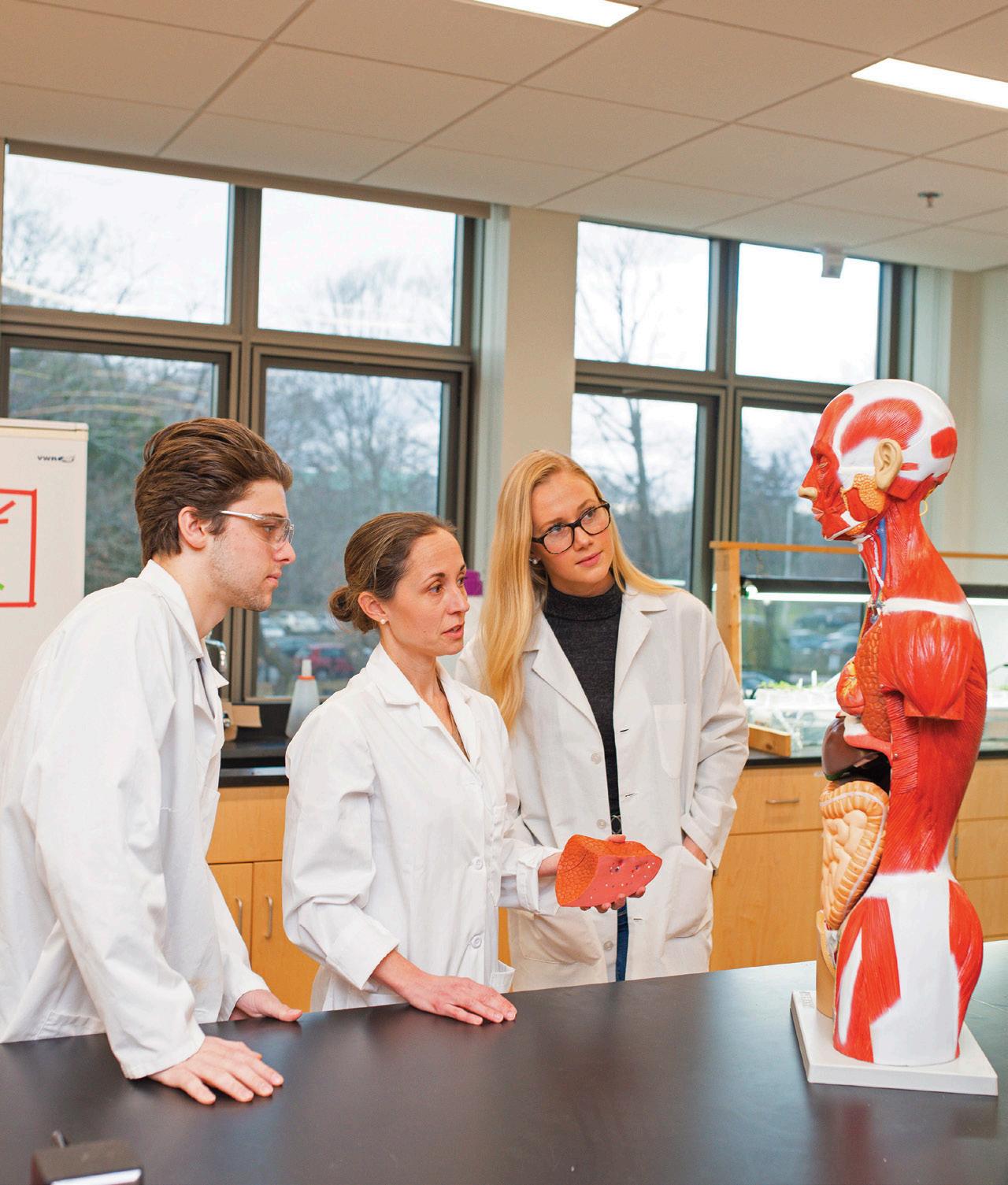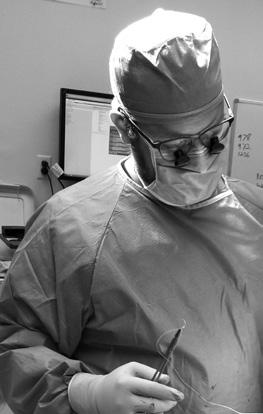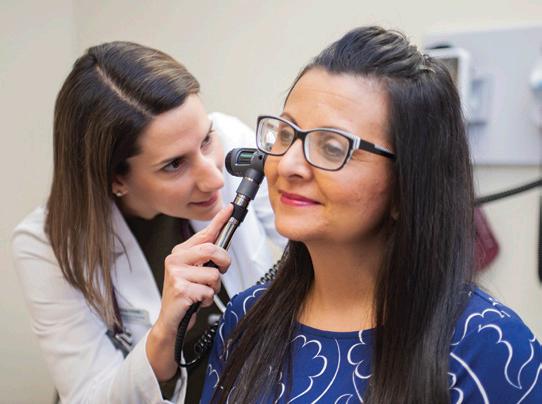
12 minute read
Profiles in Medicine
by Quentin Warren
A pre-med track + liberal arts = SUCCESS for alumni in health care professions
Advertisement
Richard Dowd ’10 and Bianca Caetano Thorpe ’06 both graduated with plans in place to enter medical school and become doctors. Like any number of medical professionals before them and after, they credit the education they received at Salve Regina with giving them not only the technical background to pursue those plans, but also the broadminded, free-thinking outlook any doctor needs to be truly relevant in a line of work defined by human interaction.

- Dr. Richard Dowd ‘10

- Dr. Bianca Caetano Thorpe ’06
The Pre-Med Undergrad Program

- Dr. Steven Symington
The pre-med track blends the breadth and essence of a liberal arts education with the academic tools necessary for any student whose sights are set on a career in medicine. The biology, chemistry, biochemistry and biomedical sciences curricula emphasize a comprehensive foundation in the basic principles of those fields, and are adapted to the varied requirements of graduate school matriculation. Dr. Steven Symington, associate professor and chairman of the Department of Biology and Biomedical Sciences, maintains that this is by design and essential to providing the bridge to graduate work.
“Our curriculum in biology, for example, is set up such that Salve’s undergraduate biology requirements are in line with the requirements typically necessary for medical school,” said Symington. “The chemistry curriculum is set up the same way. Basically, in terms of preparing our students, we make sure that they take all the classes in our standard program of study that they would need for med school.”
Standardized testing and diligence beyond the framework of the published syllabus are part of the equation, too. “We conduct real-time testing in preparation for the Medical College Admission Test (MCAT) and any other standardized tests required for medical school,” Symington explained. “Additionally, both the chemistry and biology departments have active research programs that involve undergraduates in laboratory work, internships and physician shadowing. It’s a very positive co-curricular activity for our students, another dimension that has been helpful in expediting the application process.”
- Dr. Steven Symington

Dr. Kimberly Curesky advises Elizabeth Baldwin ‘22 on courses.
Dr. Kimberly Curesky, lecturer and career health advisor, recently joined the faculty and is charged with guiding students through the process of defining their goals and meeting their academic obligations. Curesky received her bachelor’s degree from the University of Connecticut, and a Doctor of Podiatric Medicine from Temple University in Philadelphia. Given the obstacles she faced as an undergraduate at what she perceived to be a large, relatively impassive institution, her crusade on campus has been to provide her pre-med advisees with focused personal attention tailored to their needs. “I’ve been meeting with a lot of first-year students who have come here interested in becoming doctors or physical therapists, for example, or medical assistants or CNAs,” said Curesky. “They still have four years to go, and a lot can happen in that time. Do they stay on track, or do they diverge and find another interest? As much as we are guiding them along their chosen paths, we must make sure that they are not neglecting other parts of themselves to get to their end goals. It’s more than just classes, where they are very well prepared, it’s looking after the rest of them, too.”
- Elizabeth Baldwin ‘22
“We are happy to have Dr. Curesky here,” Symington said. “It’s a new position for our University, having someone on the faculty to see that our students are meeting the specific requirements of med school or whatever other health carerelated career track they may be headed down. Kim is a mentor who can provide this level of insight, making sure that students are taking the right courses and moving in the right direction, giving them the information and tools needed to make their own decisions about careers related to medicine.”
One aspect of the undergraduate experience that Dowd and Thorpe both consider pivotal to the realization of their successful careers is that Salve delivers its pre-med program within the context of a liberal arts education. Being wellrounded intellectually and ethically is noteworthy in a world increasingly driven by specialization and rigidly pigeonholed career opportunity. The core curriculum draws on the institution’s founding mercy values, acknowledging the guidelines of faith and reason and the ideals of the Catholic intellectual tradition.
“A small liberal arts school gives you the opportunity to develop things that you may not necessarily align with a profession, but you may see them as an enrichment of your life,” explained Symington.
Significantly, the benefits of the pre-med program both academically and personally are in force as much now, for current students, as they were for Dowd and Thorpe a decade ago. Elizabeth “Libby” Baldwin ’22 reflected enthusiastically on her time at Salve with two years yet to go.
“After completing my undergraduate biology degree, I am planning to attend a four-year medical university to become a Doctor of Medicine,” said Baldwin. “I’ve never wanted to enter into any career field other than medicine. All of the courses I’ve taken and am scheduled to take are essential prerequisites for medical school and for scoring well on the MCAT exams. There are so many great classes at Salve in preparation for a future in medicine and the undergraduate program has been an incredible experience for me so far.”
It's All About People
Dowd is currently five years into a sevenyear neurological surgery residency at Tufts Medical Center in Boston, Massachusetts, following which he will enroll in a year of fellowship to focus more profoundly on neurosurgical oncology (the surgical side of brain cancer)—all of this in anticipation of becoming a recognized expert in the field at the culmination of his training.
After graduating with his bachelor’s degrees in biology and chemistry, Dowd entered a five-year master’s program at the New York University School of Medicine that conferred on him not only his M.D. but also a joint degree in clinical investigation prior to his residency at Tufts. There was no doubt in his mind as an undergraduate that this was the direction he wanted to pursue.
“When I went to college, I already had the notion that I was going into medicine. I knew I wanted to do something in the sciences, and my goal from day one was to turn that into a medical career,” said Dowd. “I took Steve Symington’s neuroscience class and I really liked it, so I knew I wanted to do something neurologically based—neurosurgery or neurology.”
“Richard Dowd wanted to be a doctor from the moment he got here,” Symington recalled. “He was an amazing kid. I always remember him because he was the first student I’ve ever seen who actually prepared his applications for medical school the way you’re supposed to, on time and down to the letter, and that’s because he knew exactly what he wanted to do.”
Knowing what you want to do is half the battle, but Dowd is quick to point out that Salve gave form and substance to those career ambitions, with faculty who provided critical guidance regarding course allocation and medical school syllabus requirements.
“Within the Salve community I found wholly supportive, instructive supervision about what I needed to do to get where I was going,” he recalled. “From the very beginning my academic counselor said to me, ‘Okay, you know you want to go into medicine, so these are the things that a medical school application will be looking for, the things you need to accomplish before you even try to apply.’ And she did that with every biology major and chemistry major in the department; she sat down with each one of us and said, right off the bat, ‘What do you want to do with this degree?’”

Dowd also benefited from the liberal arts component, which opened his mind to issues of life and ethics beyond the rigid parameters of science. Ultimately—and any good doctor or physician would recognize this—medicine is all about people when you apply it in practice. And the core academic syllabus speaks to that human element.
As Dowd described it, “The focus of those non-science classes we were required to take largely involved ethics and the humanities, absolutely applicable to a career in medicine, absolutely applicable to things like talking competently about why it is that we do what we do—talking to people in the interview process on the way into medical school, talking intelligently about where your ethical standpoints lie in the day-to-day conduct of being a doctor. It is helpful to be able to have a framework within which to deal with ethical challenges, all of which I learned at Salve.
“I was ahead of the curve when it came to the basic science courses I had to take in medical school,” continued Dowd. “Concepts that I mastered in my freshman and sophomore years were confusing to a lot of graduate students from other institutions who perhaps hadn’t been exposed to them. The academic background that the philosophy and sociology majors were touting—because they got into medical school even though they were humanities majors, implying that they had a better understanding of the human condition—was never an issue for me. I didn’t feel at a disadvantage there in the slightest because of the fact that I went to Salve and I had all those important humanities courses that I was ‘required,’ thankfully, to take.”
A Physician and Teacher

- Bianca Caetano Thorpe ’06
- Bianca Caetano Thorpe ’06
Thorpe spent four years in medical school at the Edward Via Virginia College of Osteopathic Medicine in Blacksburg, Virginia, where she received a Doctor of Osteopathy (D.O.) degree. After that, she completed a three-year residency at Memorial Hospital of Rhode Island while enrolled in the Brown University Family Medicine program. She is boardcertified in family medicine and a member of the American Academy of Family Physicians and the American College of Osteopathic Family Physicians.
Today she is in family practice at Prima CARE, an accredited primary care provider based in Fall River, Massachusetts. Given that the offices are physician-owned, Thorpe conducts her practice unilaterally under the auspices of the Prima CARE health care model.
In her current role, Thorpe undertakes care once typically relegated to general practitioners, work that would have included under that moniker everything from pediatrics to treatment of the elderly. She chooses to concentrate on older children and adults, although she is certified to address any medical concerns within the full gamut of family care.
Like Dowd, Thorpe entered Salve with the notion firmly in place that her interest in the sciences would lead to a career based on pre-med training.
“I always figured that the undergraduate program I sought would involve apre-med track, even if it wasn’t a full-on premed program,” Thorpesaid. “I didn’t pursue a pre-med major, rather it was a biology majorand a chemistry minor with secondarily a focus in pre-med.”
Thorpe’s resolve to become a professional physician was never in doubt. “I really didn’t have to worry about my pre-med track,” she said. “In terms of the curriculum, Salve already had my pre-med prerequisites in place.”
Thorpe’s appraisal of her undergraduate academic experience mirrors Dowd’s in significant and meaningful ways. Salve took her beyond the drier mechanics of a formative pre-med curricular setting to a level of human awareness that has informed and deepened her professional bearing as a physician.
“I was always more of a science and math person,” she said, “but it was nice to have that liberal arts accent—philosophy, world religions, English, the language arts—aside from the rudimentary science prerequisites I faced. My medical school, and I believe most medical schools, actually prefer that you focus in something random, whether it’s history or music or any divergent non-science minor. I like the sciences, but I think coming from Salve I had a little bit of both.”
It comes down to the human element that underlies so much of medicine and holistic medical care. The family practitioner in Thorpe gets this, and she attributes her understanding in no small measure to the educational experience she encountered at Salve.
“People think of doctors and medicine in general as being very science-focused, and sometimes it is black and white— there’s the research we go by, there are the guidelines we follow,” she remarked. “But at the same time, to be a great physician you have to be well-rounded and you have to understand the art of medicine.
“It’s not just the science behind it and the facts, it’s how to tiptoe around that ethically; it’s in communicating with patients, guiding them and teaching them,” Thorpe continued. “We are teachers, to be honest. All day long I teach my patients about their health and guide them to make the right decisions. It’s more than just the medicine.”
3+ 3 Pharm.D. Program
Salve Regina and the University of Saint Joseph in Hartford, Connecticut, have partnered to develop a pathway for Salve’s undergraduate science students to earn the doctor of pharmacy degree (Pharm.D.) in six years.
Under the new 3+3 Bachelor’s and Pharm.D. Program, students enrolled in the B.S. in biology or B.A. in biochemistry may apply during their third year of study to complete their next three years of pharmacy training at University of Saint Joseph (USJ), culminating with the Pharm.D. During their fourth year, participating students will earn their bachelor’s degrees and will be able to participate in undergraduate commencement with the Salve Regina community.
“The Salve/USJ 3+3 Bachelor’s and Pharm.D. Program is a wonderful opportunity for those students seeking a career in the pharmacy industry but also desiring a strong foundation in either biology or biochemistry, and the well-rounded liberal arts education highly valued by employers,” said Dr. Susan Meschwitz, associate professor and chairwoman of the Department of Chemistry.
“We are excited to welcome qualified Salve Regina students to this 3+3 program that offers them the ability to complete two degrees seamlessly and access professional opportunities more quickly,” said Dr. Joseph Ofosu, dean of the School of Pharmacy and Physician Assistant Studies at USJ. “Students will benefit from USJ’s history in the health science arena, as well as its long-standing collaborative relationship with hospitals and health-care facilities through required clinical placements.”
Employment of pharmacists is projected to grow 14 percent from 2012 to 2022, according to the U.S. Bureau of Labor Statistics, and starting salaries for pharmacists reflect this demand, averaging approximately $100,000. Pharmacy is number one on Kiplinger’s list of “Ten Best University Majors for a Lucrative Career.”
“Given the Mercy mission alignment of our two institutions, and the increasing need for pharmacists, the Salve/USJ 3+3 partnership brings ‘mission to market’ in an innovative and practical manner,” said Dr. Nancy Schreiber, provost and vice president for academic affairs.









